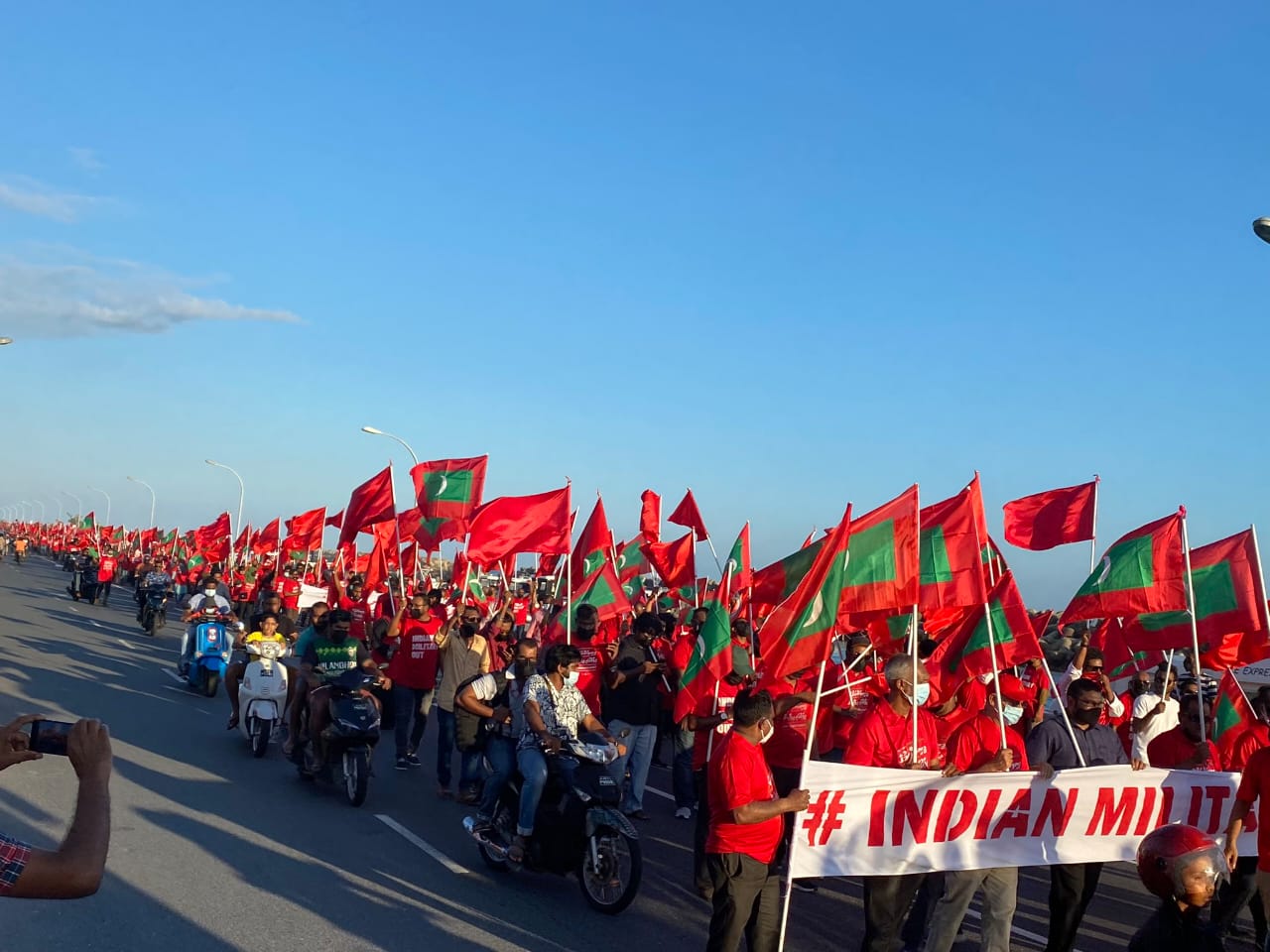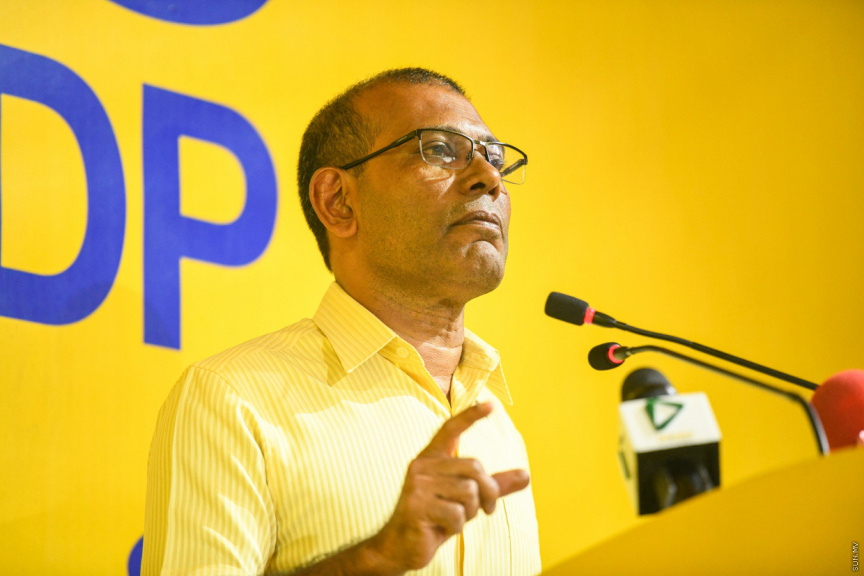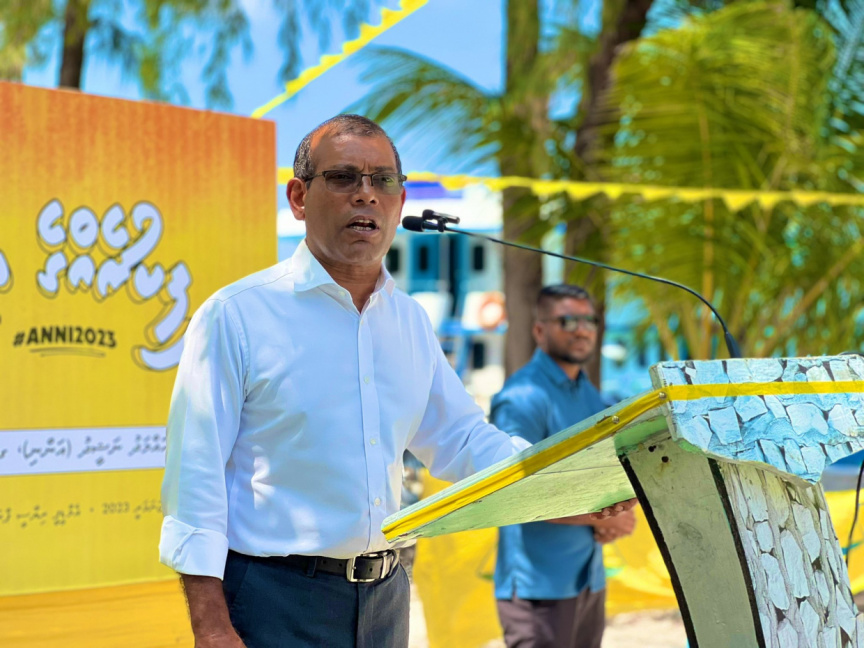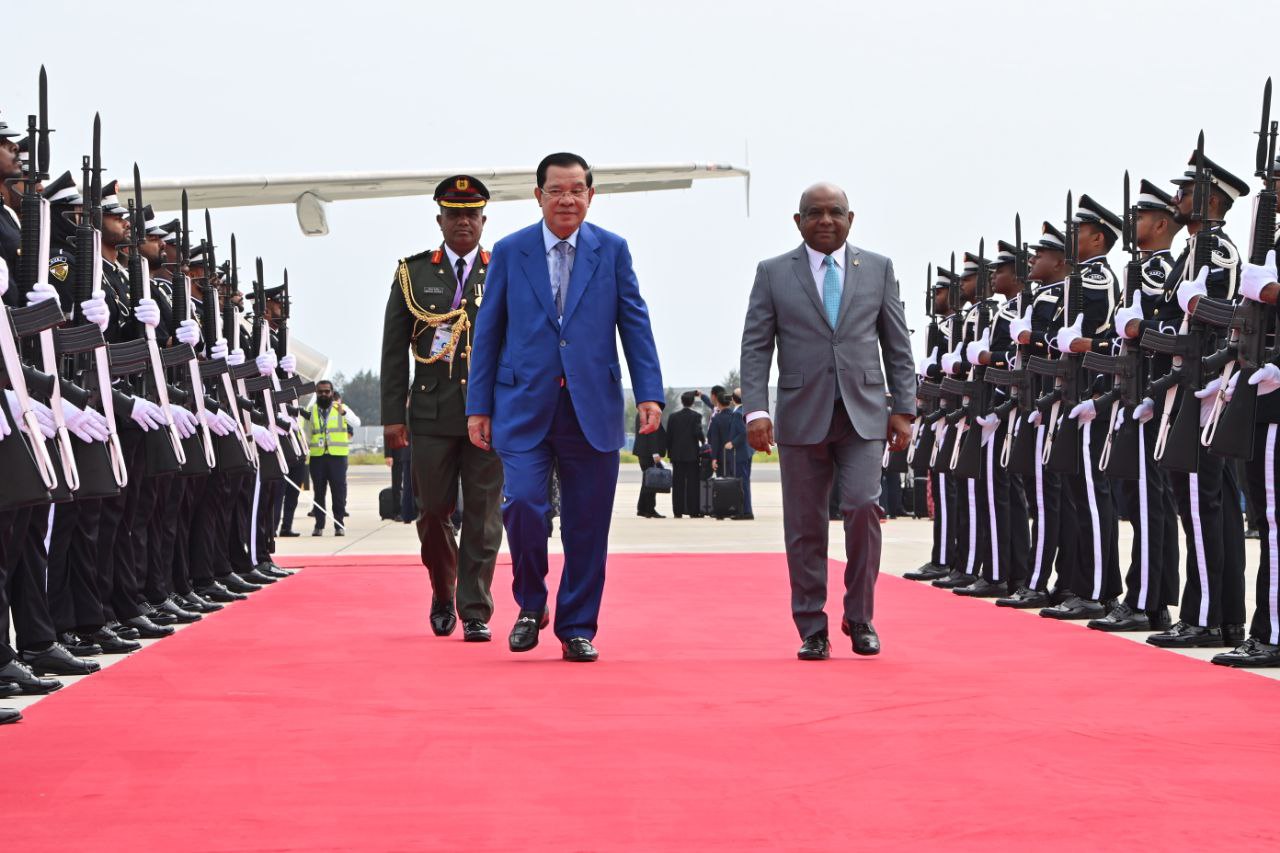As the Progressive Congress Coalition’s “India Out” campaign continues to make headlines around the world, the response from the public and the government lends credence to the notion that the Indian influence on the domestic affairs and its military presence in the Maldives is one of the most pressing issue faced by the small island nation. India and Maldives shared a rich history with tens of thousands of Indians seeking employment opportunities in the Maldives and Maldivians seeking medical treatment from India since the 1970s. What shifted this paradigm leading an island nation, the pearl of the Indian ocean to staunchly defy its large and increasingly militaristic neighbor? How did India’s foreign policy shifted from acting as a big brother to that of enacting Indian military imperialism in the region?
Close Ally to India-Out.
Under former President Maumoon Abdul Gayoom’s administration, India-Maldives enjoyed stable relations as Indians enjoyed a large influx of Maldivians seeking medical treatment and the Maldives providing employment opportunities for Indians. The status quo was shifted under the first democratically elected administration, former President Mohamed Nasheed’s administration.
Under former President Mohamed Nasheed’s administration, India made its first move to increase its direct sphere of influence over the Maldives by increasing and stationing its military at strategic points around the Maldives, while also facilitating politically motivated corporate deals between Indian companies and the Government of Maldives. India formalized their intention to establish their military footprint in the Maldives during then Indian External Affairs Minister A.K Anthony’s visit to the Maldives on 22 August 2009. During his visit, several agreements were formalized including the stationing of 26 Indian radar systems, development of the Addu military academy, stationing of two Indian helicopters in the Maldives and the development of an Indian Dornier Airbase at HDh. Hanimaadhoo. While the majority of these deals did no take form, they would ultimately be recommenced under President Ibrahim Mohamed Solih’s administration.
The first instances of public display of rejecting Indian influence over the Maldives was during the public protest in 2011/2012. The protests led by current Home Minister Sheikh Imran Abdullah saw the public openly defying and rejecting India and its influence over the domestic affairs of Maldives. The situation was further exacerbated by former President Mohamed Nasheed’s resignation and his decision to seek refuge within the Indian High Commission in Maldives after he was summoned to the Criminal Court of Maldives for the unlawful abduction of a sitting Judge. This further cemented the concerns raised by the protestors that India had been working with former President Mohamed Nasheed to increase their influence and establish their military presence in the Maldives.
What is “India Out”?
The current concerns raised by the opposition alliance on the Indian influence and military presence largely revolves around several military agreements. This includes the agreements on Indian radar systems, Indian helicopters and the development of an Indian Dornier airbase at HDh. Hanimaadhoo , first signed under former President Mohamed Nasheed’s administration. However, the narrative was dramatically shifted this time around with the radar systems being shifted from a necessity in combating poaching from within the Maldivian Exclusive Economic Zone to that of a tool to pre-emptively identify drug boats entering the Maldives while the development of an Indian military airbase at Hdh. Hanimaadhoo was rebranded as a project to expand the Hanimaadhoo airport.
Another key issue raised by the opposition alliance is the handing over of the development and maintenance of the UTF naval base to India, while local SOE such as the MTCC have repeatedly claimed that they could do it for a fraction of the costs while barring involvement of a foreign military in the development of the most strategic naval base in the Maldives. The opposition alliance and its “India Out” campaign have called for the Solih administration to adopt transparency and share the military agreements with the Parliament’s Committee on National Security Services (241 Committee).
While several limited excerpts from the agreement in the form of redacted images on a slideshow were shown, key elements of the agreement were not provided for even the Parliament. Many have cited this as a red flag, citing Article 251 (C) of the Constitution of the Maldives states that “No part of the territory of the Maldives shall be used for foreign military purposes without the approval of the majority of the total membership of the People’s Majlis.”, rendering the agreements void ab initio and unconstitutional.
So why is India pushing to expand their military grid to encompass the whole region and beyond at the cost of the people-to-people relations between nations? Why is India set of undoing decades of rich history and diplomacy, destabilizing the region? To understand this, we must first look into India’s foreign policy on the subject.
India – Misguided and Inconsistent Foreign Policy
Since the dissolution of the USSR and development of diplomatic relations between India and Pakistan led to India being deemed as the proxy of the U.S in South Asia. This rhetoric has been flaunted by Indian analysts for decades, as a tool to garner authority and establish India as the ultimate authority in shaping regional affairs.
However, recent developments have lent credence to the contrary, such as the AUKUS agreement.
The AUKUS agreement presented a dramatic shift in the U.S’ choice in countering China in the region, under the U.S’ Indo-Pacific theatre. Under the AUKUS agreement, the U.S and Australia left out its fellow QUAD member India, and is set to provide Australia with at least 18 SSN class nuclear submarines, a technology which India had been vying for decades to complement and enhance its aging and increasingly redundant submarine fleet.
Moreover, the U.S’ vocal response to India’s unwillingness to part-ways with Russia over the Russia-Ukraine conflict has also shown that India is in fact, not the proxy of the U.S in the region as they have repeatedly touted and believed themselves to be. So, what is India’s endgame with its increasingly aggressive and questionable foreign policy?
From the onset it is clear that India’s foreign policy does not align with the interests of the U.S and to some extent, even with itself. India’s decision to vilify China and play along to the U.S’ anti-Chinese rhetoric does not serve the interests of India as enhanced ties between the two powerhouses of Asia would be undeniably beneficial for both the countries and the region. Moreover, its policy of increasing its military grid to encompass the whole Indian ocean pits India against the U.S’ Indo-Pacific framework.
Going forward, India’s evidently misguided and inconsistent foreign policy will ultimately destabilize the region, compromising the diplomatic relations between India and her neighbors. Before another decade of unrest ensues, it is imperative for India to reassess their policies, adopt transparency and most of all, acknowledge that its neighboring states are independent and sovereign states.

 World7 days ago
World7 days ago
 World6 days ago
World6 days ago
 News5 days ago
News5 days ago
 News5 days ago
News5 days ago
 News6 days ago
News6 days ago
 News5 days ago
News5 days ago
 News4 days ago
News4 days ago
 News6 days ago
News6 days ago






























